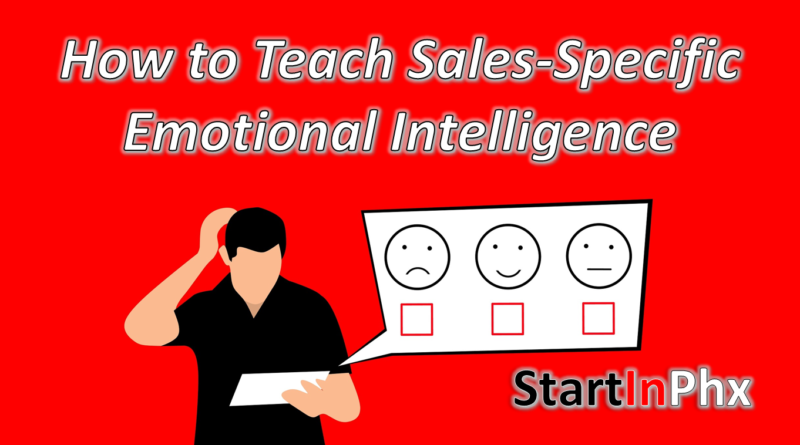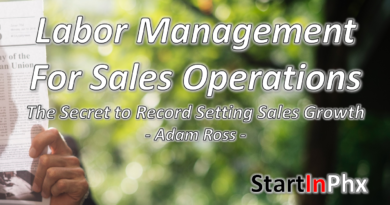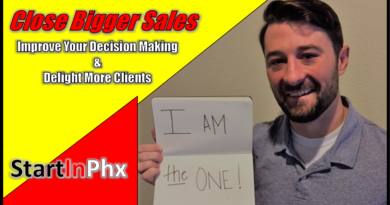Teaching Emotional Intelligence as a Sales Leader
Teaching EQ to Sales Professionals
Emotions play into every single decision we make and buying decisions are no different. As sellers we know that emotions can have both a positive and negative impact on the sales outcomes we’re looking for. For this reason emotional intelligence is key to winning in sales.
Regardless of which stage of the sales process you’re in – demand generation, qualification, the needs assessment, or the final negotiations that lead up to closing a sale – knowing how to navigate the emotional landscape of a buyer’s journey is crucial to success.
Buying decisions are made emotionally first and justified logically second. Emotional intelligence [EQ] lets you discern what emotions your buyers are feeling, when your buyers are emotionally ready to buy, and how your salespeople can influence a buyer’s emotional triggers to buy.
Plenty of sales leaders recognize the importance of emotional intelligence in sales but struggle to truly understand it themselves, making teaching EQ to their salespeople near impossible.
EQ is not something that we can measure directly and its impact cannot be accurately predicted. Yet, we know that soft skills do produce hard results, and we’re all looking for results.
So how do you teach emotional intelligence to your salespeople?
We need to first establish a common definition and determine the traits of a high EQ salesperson.
In a nutshell, emotional intelligence is the capacity to identify, understand, and manage emotions. In that sense, we want to develop the traits that will help salespeople better identify, understand, and manage emotions; both their own and that of their prospects.
Assertiveness
Assertiveness isn’t about forcing yourself on others and it isn’t about convincing them that you are right all the time. Aggression and tension isn’t the goal and there shouldn’t be any of that. Tactful assertiveness is about protecting your interests and knowing that it’s alright to stand firm when the moment calls for doing so.
For context, let us look at an excellent example brought up by Colleen Stanley during her interview with Jill Konrath:
“It’s usually ideal for salespeople to request for a budget estimation before drafting a proposal. However, prospects often do not do so and give salespeople responses like ‘I’m not sure.’ ‘We don’t have one. Or, ‘Just put something together.’
When confronted by this, non-assertive salespeople grapple with the feeling of becoming too pushy and end up leaving without it. Only to waste their precious time drafting a proposal for their prospect to say that they aren’t willing to pay that much.”
In this scenario, the lower the salespeople are on the scale of assertiveness, the more prone they are to mismanage emotions. When their personal need for psychological safety emerges, it gets tangled up with the sales objectives and that sets up for potential losses.
However, there’s more to developing assertiveness than having salespeople who are adept at keeping their emotions separate from their sales objectives. It’s about teaching members of your team greater control over their emotions, standing firm in their beliefs, and expressing them.
Teaching Assertiveness to Sales Professionals
Teaching assertiveness can be as simple as instilling confidence in a salesperson by helping them see their value and that of their ideas through having them take more active roles in all conversations, not just the conversations they have with prospective clients.
Be it in one-on-one conversations or group meetings, you’ll want to put a plan into practice and allow it to permeate throughout your workplace culture. That’s the only way to ensure every team member embraces the idea that their voice is of value.
By making tactful assertiveness habitual, your sales team will transform their mentality about speaking up when needed. Without much effort these kinds of habits and mental shifts will spill over into their sales activities.
In an article by Charles Duhigg, he cites a scientific paper on the factors affecting team performances. In that study, psychologists from Carnegie Mellon and MIT worked together to discover two similarities across high-performance teams.
The first characteristic observed in high-performance teams is that every member of that team spoke roughly the same amount. In the words of the psychologists, there was “equality in distribution of conversational turn-taking.”
The confidence and assertiveness gained from conversational turn-taking builds up like financial equity, meaning it a fluid and dynamic thing that needs to replenished as much or more than it is used.
As a sales leaders however, you can’t expect your sales team to achieve the levels of conversational turn-taking that give way to healthy assertiveness from speaking to with prospects. As a sales professionals yourself you know that those conversations, while they require tactful assertiveness, they are also most successful when heavily unbalanced, with the prospect doing most of the talking.
Leadership induced conversational turn-taking is probably best exemplified by Saturday Night Live producer, Lorne Michales’ ability to navigate the emotional landscape of his writes’ room.
Similar to the dynamic of a sales team, SNL writers are constantly competing. In the world of SNL the competition exists because only the best of ideas actually get airtime on Saturdays, among a sales team the competitiveness is fostered by everyone aspiring to out performer their peers at the end of the day, week, month, or year.
In both circumstances self-serving motives can create for a less than open dialog between members of the team: SNL writers talking over one another or being unwilling to help improve the ideas of their cast mates and sales professionals not sharing best practices with their peers. That kind of siloed work and development ends up preventing the iron-sharpening-iron effect leaders are after when they bring together, in one place, the very best talent they can find
In the early days of SNL the loudest egos could have very easily drown out the other voices in the writers’ room. Half baked ideas never would have had a chance to grow into the comedic staples we now think of when we think of SNL’s +40 years on air success.
So how has Lorne Michaels kept the delicate balance of conversational turn-taking among SNL writers over the last +40 years?
He simply tallies with pen and paper each time a cast member speaks during a meeting, not allowing a meeting to end without circling back to those who had contributed least and prompting them for input until contributions to the conversation ware relatively equal.
The second characteristic observed was “high average social sensitivity” or as we know it, empathy.
Empathy
Empathy runs deeper than simply picking up on somebody’s non-verbal cues and feeling what they’re feeling. It’s also the ability to put yourself in their shoes and respond with behaviors that work to resolve their emotions.
Colleen Stanley illustrates this really well in an article she wrote for Salesforce.com. She asks readers to compare two elevator pitches and to note which might bring out a more emotional connection with a prospect.
(1) “We have a great customer service with 24/7 support and highly trained personnel.”
Vs.
(2) “We typically work with clients who are frustrated with poor customer service. They are wasting a lot of hours stuck in voicemail trees and they can’t connect with a live human being.”
Pitch (2) is clearly meant to come out the winner of this battle. It demonstrates listening and an understanding of the client’s pain by repeating it back to them. Doing this communicates an offering in a much more visceral manner.
Fostering empathy among your sales team will have a similar effect. It will give your people the ability to capture their prospects’ attention and pitch ideas your ideal customers can’t help but latch on to.
Teaching Empathy to Your Sales Team
Back in the marketing department of UserTesting, Jennifer Winter notes that the team gathers to conduct sharing sessions every Monday. As she talks about in an article for UX BOOTH, each member takes turns sharing the past week’s high and low from their personal and professional lives with the goal is to grow in empathy.
Incorporating sharing sessions such as this forms a habit of listening and understanding people’s emotions. It exposes and familiarizes your salespeople to each other’s best and worst emotional periods and sets up opportunities for them to have conversations about it. This fosters empathy within each person as they participate in both sharing and active listening.
The greatest benefit to your sales team is that empathy translates to emotional versatility in how your team approaches conversations with their prospects. It makes them more flexible and open to different selling strategies: strategies that match their client’s unique psyche.
Want to increase the closing ratio of every one of your sales reps?
Giving them the ability to tailor-fit solutions and pitches is how you do it.
Calls to action only hit their target when they speak to the unique situation and emotional landscape of the particular prospect a rep is working with. Empathy is the key to understanding which calls to action will land with which prospects.
Self-Awareness
Self-Awareness is the capacity to consciously know yourself. What you’re thinking and feeling, why you’re thinking and feeling it, and how that thinking and feeling will affect your subsequent thoughts, decisions, and actions.
It is a very fundamental component to have because it sits at the core of developing emotional intelligence. If your salespeople aren’t aware of their thoughts and actions, it makes it difficult for them to identify their areas for improvement.
In an article by sales trainer Anis Qizilbash, she shares a personal encounter with a salesperson who lacked self-awareness. Anis was hired as a trainer that went in disguise as a trainee to attend a client meeting with Peter, the salesperson of interest.
“Before the meeting, Peter prided himself on how well he handles his clients and mentioned that whenever he realizes he’s speaking too much, he’ll stop himself to let the client speak.
However, that wasn’t the case at the meeting. Peter dominated the conversation after asking only three questions and the prospect had to struggle to get a word in. When it concluded, Peter had thought the meeting went well and that the prospect was interested.”
People who are less aware of themselves tend to experience a larger gap between their perceived reality and reality itself. That’s because they fail to question it and accept their beliefs as fact. Lucky enough, self-awareness can be easily practiced by asking more questions.
Teaching Your Salespeople Self-Awareness
Since self-awareness is about “knowing thyself,” the approach isn’t that different from learning about the thoughts and emotions of your customers. Or anyone else’s for that matter. Your salespeople just need to learn to be more inquisitive about themselves. They need to develop a habit of questioning themselves, giving answers to those questions, and further questioning the answers they give.
In “12 Self-Awareness Exercises That Fuel Success”, Thai Nguyen starts out his list with “The Three Why’s”.
“Before acting on a decision, ask yourself ‘Why?’ Follow up your response with another ‘Why?’ And then a third.
If you can find three good reasons to pursue something, you’ll have clarity and be more confident in your actions. Being self-aware means knowing your motives and determining whether they’re reasonable.”
On the same note, Brendan Alan Barrett believes that true awareness comes from questioning everything. Extending our self-awareness to include the decisions we influence, the people we affect, and the outcomes we impact.
As a sales trainer, he teaches salespeople to ask and internalize questions like:
Why isn’t the prospect interested in giving us an opportunity to explore if we can help them?
Why won’ they let us know what kind of budget they are working with?
Why do they feel that way?
Why didn’t I recognize that while we were still talking?
Which can lead them to more profound questions like:
How can I help them to understand the value proposition they are overlooking?
How can I prevent this from being a setback when speaking with future prospects like this one?
When sales leaders ask salespeople questions like this – and have them actually think and answer for themselves, instead of giving them the answers – the salespeople will gradually pick up the practice of introspection. As they ask and answer more of these types of questions, they’ll increasingly develop their self-awareness, even without direct oversight from their boss.
Emotional Intelligence
Doesn’t Come Easy to Salespeople
There’s definitely a high degree of variability when dealing with people. Especially so when you’re dealing with the emotions of a buying decision.
Of course, just like learning or developing anything else, consistent practice and ‘smart’ practice will hand you your desired results when it comes to teaching EQ to your sales team. The idea is to expose your salespeople to sales situations or just emotional situations in general so they can practice applying their emotional intelligence.
As long as they’re training their mind to think and their bodies to act with emotions in consideration, there will be changes. Just don’t expect them to take shape overnight. These changes happen at very incremental levels.
It will take a lot of discipline, patience, and perseverance to teach your salespeople to become proficient. After all, it’s the difficulty in achieving high emotional intelligence in sales that makes top performing salespeople so valuable.
About The Author of This Article: George Eliot is a writer and passionate learner of all things learnable. Know more about him and what he does at his website (writerandmore.club). Where he writes about his interests in behavioral science, business and more. Additionally, you can connect with him on LinkedIn.
Struggling to Drive Sales in Your Business?
DOUBLE MY REVENUE
7-Day Sales Challenge
Whether you’re a sales professional or entrepreneur who needs to level up their sales skills, this free 7-day challenge will teach you how to better identify and prioritize prospects you can convert into customers quickly. It will also teach you proven systems for year-over-year sales growth.
Click HERE to learn more about this FREE 7-day sales challenge.
OR — You can click HERE to book a 1-on-1 coaching call with me!




